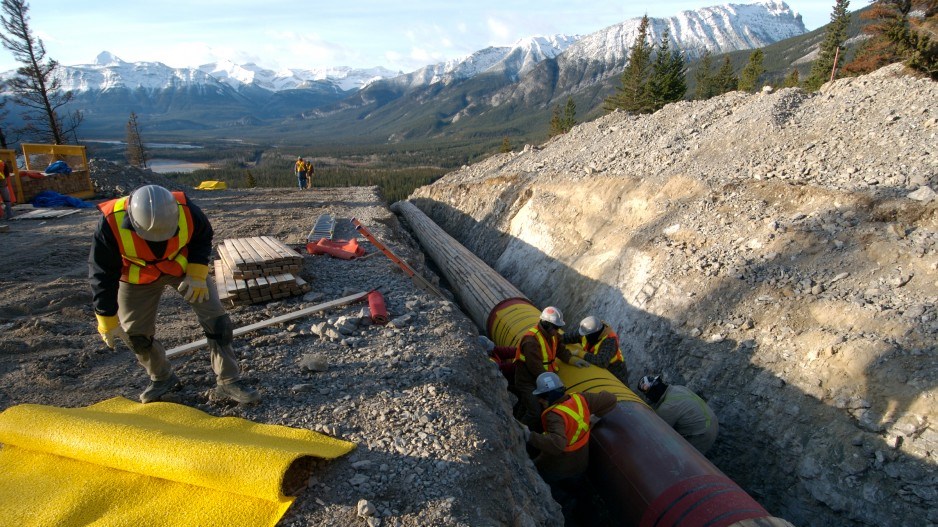Close to $1 billion has been spent to date on the $7.4 billion Trans Mountain pipeline expansion, and another $1.8 billion is expected to be spent in 2018, providing Kinder Morgan Canada (TSX:KML) can resolve “uncertainties” with permitting and court challenges.
In a January 17 fourth-quarter earnings call, Kinder Morgan (NYSE:KMI) executives said $930 million has spent to date on the expansion project.
Kinder Morgan (KMI) is the American parent company of Kinder Morgan Canada (KML), which became a publicly listed company last year, and owns the Trans Mountain pipeline and Westridge Marine Terminal.
In a 2018 spending forecast on December 4, 2017, Kinder Morgan Canada said it expected to spend $1.9 billion in 2018 – all but $100,000 of which would be on the pipeline expansion – provided it can get the certainty it needs from federal regulators and courts that it can proceed.
"KML must have a clear line of sight on the timely conclusion of the permitting and approvals processes before we will commit to full construction spending," KML president Ian Anderson said in a December 4 press release.
Although the $7.4 billion pipeline twinning project has federal approval, it has encountered delays in starting construction, which could push back the anticipated in-service date by a full year.
The biggest obstacle has come from the City of Burnaby, which has refused to issue routine permits for things like site clearing and tree cutting.
The project also still faces a number of legal challenges, the most significant of which is a Federal Court of Appeal challenge, with the B.C. government being one of the interveners arguing the National Energy Board’s approval of the project should be overturned.
In November, KML asked the NEB for a ruling allowing the construction in Burnaby to proceed without municipal permits. The application was granted, but only for the permits already in play, not for any future permits it might need. It is now seeking further ruling from the NEB to provide a timely process for resolving future permitting issues.
In its application to the NEB, Kinder Morgan warned that, "faced with unreasonable regulatory risks due to a lack of clear processes to secure necessary permits . . . it may become untenable for Trans Mountain's shareholders . . . to proceed."
The company already pushed back its anticipated in-service date by nine months to September 2020, and noted that every month of delay amounts to a $75 million loss in anticipated earnings. In its January 17 earnings call, KMI has now set the potential in-service date even further back, to December 2020.
The project’s opponents, notably the Tsleil-Waututh First Nation, have read those delays as a sign that the project may too risky for investors.
But in December, a syndicate of banks gave the project a vote of confidence when it ponied up $250 million in a preferred share offering. It was the second preferred share offering, which has netted a total of $550 million.
How much of that money will be spent this year in B.C. depends on the outcome of a federal appeal by First Nations, environmental groups and the cities of Burnaby and Vancouver, and getting more certainty over permitting.
Kinder Morgan CEO Steve Kean pointed to the December press release, in which the company noted that it had made progress, provincially and municipally, on permitting.
“But we also acknowledged the need to see more progress before it would be prudent to ramp up to full construction spending,” Kean said.
Asked by an analyst to describe what would make full execution of the project “untenable,” Kean said: “We don’t expect to find ourselves in an untenable position, but we made that point in the filing seeking the relief that we’ve asked for from the regulator.”
He added: “We have made some progress working with the provincial authorities in British Columbia on clarifying requirements and time frames of permits and authorizations. We’re still working on this, but we’ve made some progress.
“It is essential for us to know we can move forward, even when local governments are opposed or are declining to act on permits.”
Kean said KML ended 2017 with no outstanding debt and capacity to ramp up to full construction spending “when that is prudent.”
Kean said the company hopes to have a decision by the federal appeal court in the first part of 2018.



